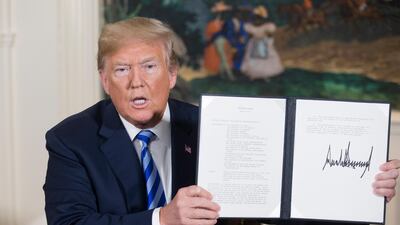Iran’s Supreme Leader ordered his government to seek quick answers from Europe over the fate of the 2015 nuclear deal on Wednesday as diplomats scrambled to react to Washington’s abrupt withdrawal from the agreement.
President Donald Trump's repudiation of agreement, known by its acronym JCPOA, set the clock ticking on a 90-day and 180-day countdown to the reimposition of sweeping American sanctions. The US leader said the deal was "defective at its core" as he called for Iran to be put under pressure to abandon its expansionist policies.
The foreign ministers of the leading Western powers in the deal - Britain, France and Germany - arranged a meeting next week with Mohammad Javad Zarif to stand fast against the American exit.
Mr Zarif's travel arrangements were made amid an orchestrated display of anger in Iran. Hardline lawmakers in the Tehran parliament burned a paper US flag on the debating floor, shouting, "Death to America!"
Ayatollah Ali Khamenei hit out at Mr Trump in bitter personal terms. “Wait for the day when Trump is dead, his corpse is fed on by snakes and insects, but the system of the Islamic Republic will still be standing,” he said.
“He threatened both the system and the nation that ‘I will do this and that,’ I say on behalf of the nation of Iran: ‘Mr. Trump, you won’t do a damn thing!”
Facing the collapse of his foreign policy triumph, President Hassan Rouhani went on television after Mr Trump to suggest a resumption of nuclear activity.
"If necessary, we can begin our industrial enrichment without any limitations," he said. "Until implementation of this decision, we will wait for some weeks and will talk with our friends and allies and other signatories of the nuclear deal, who signed it and who will remain loyal to it. Everything depends on our national interests."
However the supreme leader said he doubted the deal could be shored up. "If you don't succeed in obtaining a definitive guarantee - and I really doubt that you can - at that moment, we cannot continue like this," he told his officials.
Jean-Yves Le Drian, the French foreign minister insisted the deal was "not dead" while Heiko Maas, his German counterpart, said Europe must react with a cool head.
Boris Johnson, the British foreign secretary, doggedly defended the deal in parliament, reiterating Britain’s commitment and asking those countries opposed to the pact to come up with a viable alternative that addressed wider security concerns.
__________
Read more:
France, Germany and UK to meet Iran on nuclear deal
Iran: Trump doesn't have 'mental capacity' to deal with issues
__________
Dismissing claims the US decision was part of a build-up to war, Mr Johnson said he hoped Washington would bring forward new proposals.
"I have to tell you after closely interrogating everybody I could find in the White House, there is no enthusiasm for a military option in the United States and there is no such plan," he said. "So I think what we want to hear now is a successor plan.
“Britain has no intention of walking away; instead we will cooperate with the other parties to ensure that while Iran continues to restrict its nuclear programme, then its people will benefit from sanctions relief in accordance with the central bargain of the deal.”
Sir Michael Fallon, until recently the defence secretary, was one of a number of Conservative MPs backing Mr Trump, as he attacked the "flimsy" deal.
"Far from constraining Iranian behaviour, it has enabled the Iranian regime to use its new financial freedom to interfere in Syria, in Iraq, above all in Yemen and to sponsor Houthi attacks on our friends in Saudi Arabia," he said.
__________
Read more:
Britain urges Trump not to dump Iran nuclear deal
US stance on Iran may spur oil market volatility
Comment: The Iran nuclear deal does not have to die but it is on life support
Dollar gains against the yen amid Iran uncertainty
___________
US officials acknowledge "secondary sanctions" - penalties imposed on Iran's foreign trade partners - will have a far-reaching impact elsewhere. Europeans are seeking means of insulating their companies from the new US threat.
“The international reach of US sanctions makes the US the economic policeman of the planet, and that is not acceptable,” French Finance Minister Bruno Le Maire said on Wednesday.
Experts believe that no matter what stance the governments take, US sanctions would reduce European business dealings with Iran, which have revived moderately since the 2015 deal came into effect.
“Reimposed US unilateral sanctions would constitute one factor, among many others, potentially weighting against investment in Iran,” said Patrick Clawson at the Washington Institute.
Iran's largely Asian-based oil buyers were keen to take a business as normal approach in the aftermath of the announcement. Chinese foreign ministry spokesman Geng Shuang said the agreement was crucial to upholding the international nonproliferation regime and promoting peace and stability in the Middle East.
"We express regret over this decision made by the United States," Mr Geng said. China would "carry on the normal and transparent pragmatic cooperation with Iran on the basis of not violating our international obligation."


